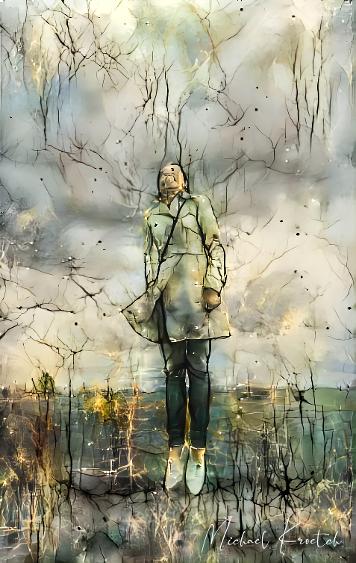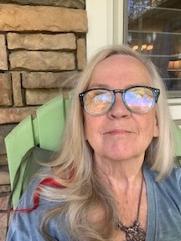Mary Magdalene and SCOTUS
creative nonfiction by Kelly Thompson
~
A year before she died, my mother came to me in spirit. She could not come in body because she was ninety-two and frail and, as they said, had dementia.
~
One day, as I spoke to her via phone after her dementia worsened, she said, “It’s too much. There’s not enough room, nowhere to put it.” I think she was trying to explain something she had said to me before her mind had completely deteriorated. Before they put a name to it. Dementia.
~
She didn’t have dementia. Does anyone? She had trauma.
~
On the day of her spirit visitation, a morning in May, a year before her body expired, I awoke with a strong awareness, a presence. Gentle energy moved within, spiraling through me. Soft and beautiful, exquisite.
~
In her sixties, she had undergone hip surgery and suffered post-surgical dementia.
~
That morning in May, in my bedroom, she was back. In presence. The mother I knew.

painting by Michael Kroetch
~
My mother introduced me to her. Mary Magdalene.
~
Let me tell you a secret. The secret of being female means keeping secrets. Being female means going underground, living surreptitiously through others, holding all of space inside your own small heart and head, and a mind that one day will crack from holding the cosmos together. And they’ll call it dementia.

Kelly Thompson is currently working on a memoir tentatively entitled Rupture, the story of one woman's journey of single teenage motherhood and out of her family's fundamentalist cult. Her work has been published or anthologized in BOMB, LARB, Guernica, Electric Literature, Entropy, Oh Comely, Dove Tales, The Rumpus, Proximity, The Writing Disorder, Witchcraft, Manifest Station, 49 Writers, and other literary journals. She is the editor and curator for the “Voices on Addiction” column at The Rumpus. Kelly lives in Denver, Colorado in the sunshine of the spirit. You can follow her on Twitter @stareenite or Instagram @kellyblog.
__________
Michael Kroetch’s cross-disciplinary art has received international awards and funding, as well as being collected by some of the finest institutions—including the Los Angeles County Art Museum, the Art Institute of Chicago, Berlin’s Momentum Gallery, and the American Film Institute. His work has been exhibited in New York, Los Angeles, Oslo, Berlin, Seattle, Portland, San Francisco, and Washington, D.C., among other places. His large panels are acclaimed for their wonderful color, freshness and luminosity, but his smaller pieces are also sought after for their intimate use of detail.
